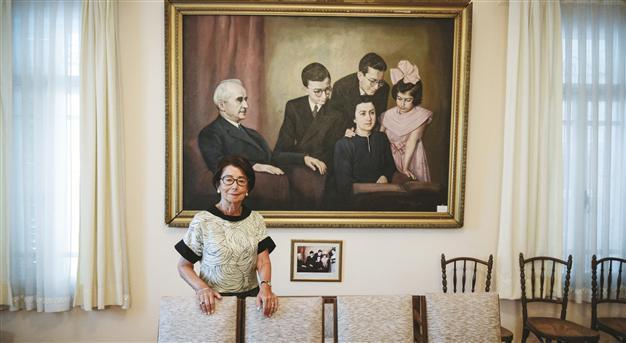Gezi showed Turkish republic is in safe hands: Ex-president’s daughter
ISTANBUL- Hürriyet Daily News

Standing in front a painting featuring her father, late President İnönü, with his family, Toker has no fears that the Republic is in danger due to Gezi spirit. DAILY NEWS photo
The Gezi Park protests proved that the Turkish Republic is in safe hands, the daughter of the country’s second president said yesterday.
Özden Toker, daughter of İsmet İnönü, spoke to the Hürriyet Daily News at the İnönü Museum House on Istanbul’s Heybeliada Island, during the celebrations of the 90th anniversary of the Treaty of Lausanne on July 24. She said that the young protesters who took part in the Gezi Park rallies over the last two months showed that the youth was well informed and was leading the way for the whole of society.
“Very good things are actually happening in Turkey. We should certainly be very hopeful,” she told the Daily News. “The youngsters we thought were not attached to anything are very well informed and they are guiding the way for us. We should trust the youth.”
Toker said Atatürk, the founder of the modern Turkish Republic, used to visit their house when she was a small child and he would advise the youngsters to trust themselves, be skeptical, examine and ask questions. “Now we see that the youth is doing this,” Toker said. “The latest incidents showed us that the republic is in safe hands, and will remain strong.”
Kemal Kılıçdaroğlu, current leader of the main opposition Republican People’s Party (CHP), founded by Atatürk, was also among the participants of the celebrations.
The CHP leader said the youth at the Gezi Park protests, which turned into nationwide anti-government rallies after a heavy-handed police crackdown on a peaceful sit-in against a controversial city-center renovation plan, were standing up against batons, bullets, sticks and Mass Incident Intervention Vehicles (TOMA) for freedom and independence. “There is no turning back now,” said Kılıçdaroğlu, adding that people who attacked protesters with machetes were left free, while people who resisted TOMAs were tried to be sent to prison. Toker said the Treaty of Lausanne, the negotiations and the signing of which was conducted by İsmet İnönü, was her father’s hardest test and thus his biggest achievement, which he took great pride in.
The Treaty of Lausanne, which was signed on July 24, 1923, was the result of a second attempt at peace after the failed Treaty of Sevres, which was signed on August 10, 1920 between the Allied Powers of WWI and Turkey. The Treaty of Sevres was rejected by the Turkish side on the grounds that significant Anatolian territory was lost, and the second peace negotiations ended in the Treaty of Lausanne.
Upon a question about the alleged secret documents of the treaty, Toker said there was no such thing as a secret document or agreement. “All of the papers of the agreement have been published as a book,” said Toker, adding that these statements were brought out just to undermine the signatories of the treaty.
Kılıçdaroğlu, said that the treaties of Lausanne and Sevres should be evaluated separately as one of them contained elements of surrender while the other one contained freedom and independence.
